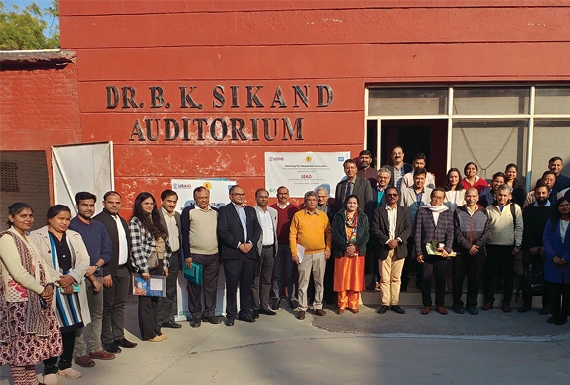A Multi-stakeholder Session to Fight Against TB, New Delhi

As part of the USAID-funded TIFA project, HPPI supported the Delhi National Tuberculosis Elimination Program team in hosting a brainstorming session on addressing tuberculosis (TB) in marginalised communities on 9th February 2024. This multi-stakeholder discussion held at STDC, New Delhi TB Centre highlighted the advancements in Delhi’s TB elimination efforts, particularly among key vulnerable populations, with a specific focus on the homeless community. It was attended by State TB Officer Dr B K Vashisht from Delhi, district TB officers from Delhi, World Health Organization consultants, and representatives from other development partners.
Dr KK Chopra (Director STDC, New Delhi) initiated the proceedings by providing an overview of India’s TB prevalence and its impact on vulnerable populations. Following his address, participants presented their work, facilitating an exchange of ideas, information, and potential future collaborations. Dr Sugata Mukhopadhyay (Technical Consultant, HPPI) delivered a comprehensive presentation on Project LEAD, outlining its activities from 1st August 2023 to 31st January 2024.
Arun Kumar Jha (JSI Senior Advisor) provided insights on community-level screening and Manoj, a representative of Wadhwani AI, highlighted the AI tool for TB screening during the session. Dr Shamim Manan, of the Clinton Foundation, shared learnings on ultraportable X-ray development, further enhancing diagnostic capabilities. The Centre for Equity presented their learnings about working with homeless populations. This session initiated discussions about developing a sustainable model for providing TB services to vulnerable populations, especially the homeless and migrants.
The conference successfully fostered a platform for knowledge sharing and collaborative action among stakeholders committed to Delhi’s TB elimination efforts. Project LEAD’s impactful work served as a central focus, sparking discussions on data sharing, operational challenges, innovative technologies, cross-industry collaboration, and patient follow-up strategies. Furthermore, it was suggested to form a working group to prepare a proposal on the integrated model to screen the homeless population systematically along with other health and social issues impacting their life.
